Causes of Dishwashing Dishes
Dishwasher (PMM) - a great helper for the hostess in the kitchen. It is able to work flawlessly for years and delight its owners with the impeccable quality of washing utensils and its functionality. Sometimes during the operation you start to notice that the dishwasher does not do the dishes poorly.
Some of the housewives scornfully refer to various factors affecting the quality of washing, explaining this attitude by the fact that the apparatus copes well with its task. But if you began to notice white stains, food debris or plaque on the plates, then the cause of the trouble can be:
- untimely preventive cleaning PMM details;
- improper use of the machine by the user;
- wrong dosage or replacement special means for washing third-party;
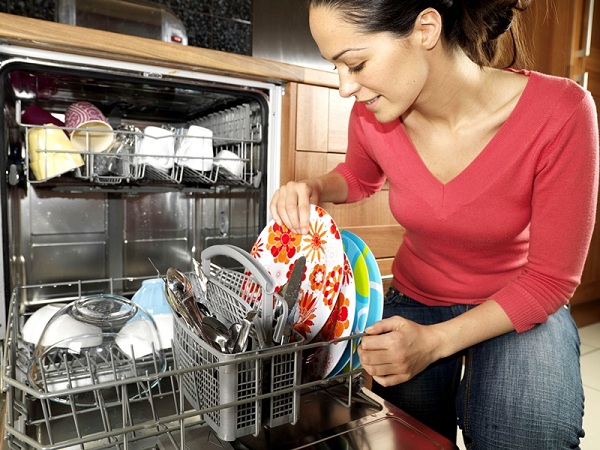
Content
Late cleaning of PMM parts
Dishwasher, like any household appliances, requires careful maintenance and timely cleaning of individual parts and assemblies. The following elements are subjected to regular cleaning in the unit:
- Tank - must be cleaned of plaque.
- Coarse Filterwhich is mounted on the inlet hose. It can become clogged with rust or small particles of scale, which is formed when welding pipes during repair of the main line.
- Water sprinklers (rocker) can be carefully removed for cleaning. They are clogged with food debris or limescale. Due to the insufficient diameter of the holes in the nozzles, the pressure of the sprayed water is reduced, and therefore the dishwasher does not effectively rinse the contents. The upper arm is unscrewed, and the lower one is pulled out by moving it up. The nozzles are cleaned with a regular toothpick under a good stream of water. Also, the cleaning can be done without removing the sprinklers by starting the machine in idle mode with the addition of a special descaling agent that will dissolve grease in the nozzles and limescale. Such a descaling procedure will also be useful for the heating element.
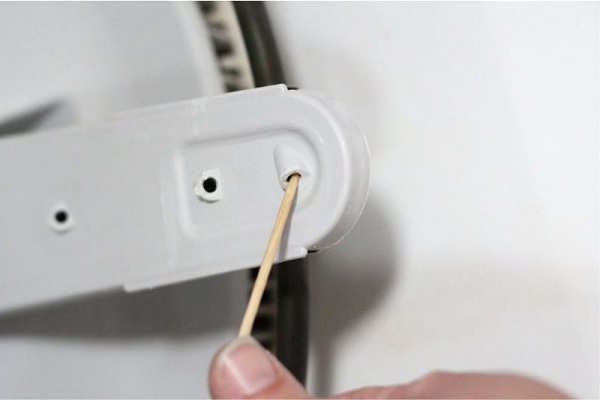
- Main filterwhich is mounted on the bottom of the tank. It is a small mesh, which is easily removed. It should be washed regularly and at least once a week.
Rinsing PMM with the use of a special agent should be carried out once every six months. And it does not depend on the frequency of use of the unit.
After each completion of the washing program, the unit should be checked for the presence of food debriswhich may be in the tank of the machine or under the door, especially if it is a Bosch dishwasher.
Incorrect operation
The reasons that a dishwasher does not do a dishwasher badly may be a hostess in typical errors of use of the unit:
- the user loads a very large amount of dishes and cutlery;
- the ware in baskets keeps within incorrectly;
- wrong wash program selected.
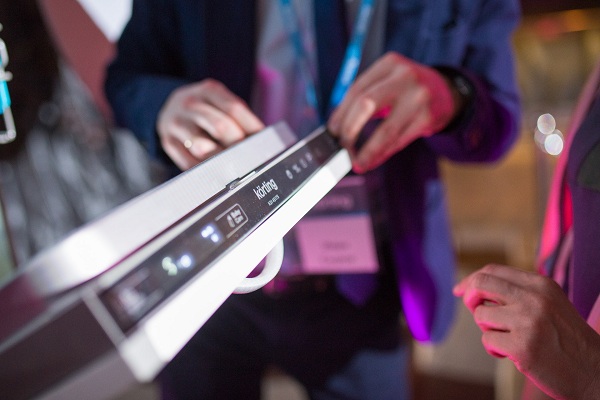
The manual describes in detail about the correct arrangement of dishes in baskets. Manufacturers of PMM (Electrolux, Siemens, Bosch) pay much attention to this issue. Therefore, it is recommended that you read these tips carefully before using the device.
One of the most important rules for arranging utensils in a basket is to arrange it in such a way that there are gaps between it and water can flow down without remaining in the plates.
You should also pay attention to the fact that the dishes in the lower basket does not block the flow of water to the upper basket. Stacked utensils should not interfere with the opening of the compartment with a tablet, as well as the rotation of the rocker arms. The more content is loaded, the denser it is. Such a tight accommodation interferes with the good circulation of water with soapy water, and it may remain unwashed.
Another reason why a dishwasher does not work well is the choice wrong programFor example, for washing heavily soiled utensils. This starts a quick wash (in this mode, the water is heated to a temperature of 45-50 C°). In this case, with heavily polluted contents with dried-on food remains of high-quality washing, you should not expect it (it would be more correct to choose a washing program with soaking). This is also described in the instructions for the unit, which very few people read.
In order to filter the machine less polluted, before loading the utensils into the machine well clean it from the remnants of food.
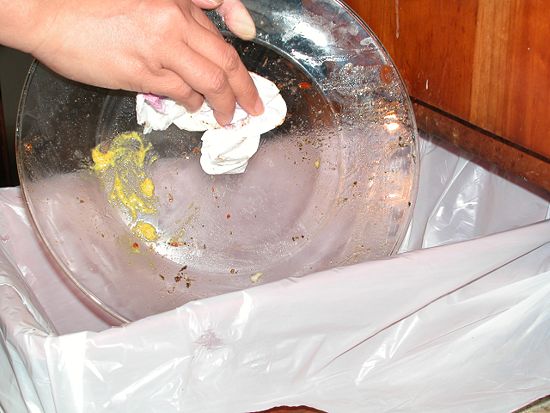
Replacement of detergents or their wrong dosage
The following possible reasons why the Electrolux dishwasher and its ilk — Bosch, Hansa, and others — are not working properly can be directly linked to the use of detergents.Most often, this problem occurs due to the change of detergent on poor quality or fake. This trouble is easily eliminated if you return to the previously used tool. Also, you can try to pick up the detergent, until you find the best and most effective option. In the event that you do not change the detergent, and the dishwasher sometimes became ill wash the dishes, the problem may be improper dosage facilities.
- If streaks appear, this may mean that there is little rinse aid in the water. In this case, you should increase its flow by changing the settings. Increase should not be much, otherwise the rinse will be poorly washed off, and the dishes will become very shiny.
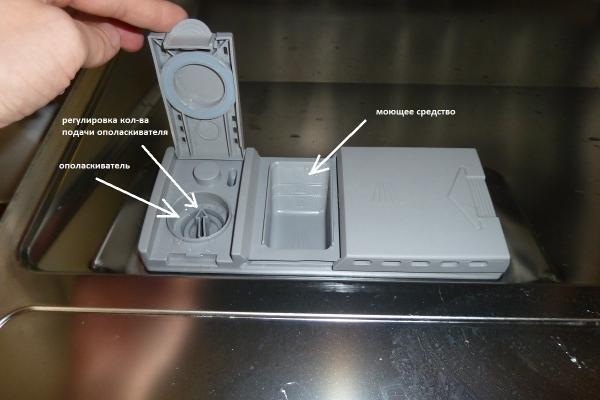
- With a poorly closed container for salt, it is capable of excessively falling into the water and white streaks may appear on the utensils.
- If there is no bleach in the detergent, there may be traces of lipstick, tea or coffee on the cups.
- For plastic dishes, the detergent composition should contain special substances, otherwise the machine is not able to wash it well.
- Another common reason for the dishwasher to become poorly cleaned may be the use of third-party dishwashing detergents that are not intended for the dishwasher.At the beginning, using such means, you are able to observe that the device effectively washes the contents, but after a while they clog up the rocker arm nozzles, and because of this, the quality of the unit's work decreases.
If the user refuses to use a special salt, which restores the ability of the ion exchanger to soften the water, then over time (if the water hardness in the line is high) it becomes clogged and fails. The use of complex tablets “3 in 1”, with very hard water, is not capable of replacing salt and still need to be added to the unit.
When you need to call the wizard
Above, the reasons for poor dishwashing with a dishwasher, which are obvious and can be eliminated without contacting the service center, were considered. But there are moments when you cannot do without a wizard call.
- Burned out water heater. At the same time, the liquid does not heat up, and it is simply impossible to wash the dishes with some contaminants with cold water.
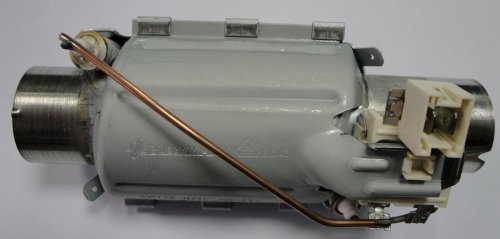
- Defective circulation pump, as a result, water is not supplied under pressure in the spray nozzles.
- Fault in the impeller rocker, which is a mechanism that rotates a sprinkler. Therefore, the utensil is rinsed unevenly and poorly washed.
- Unemployed temperature sensor (thermal switch). The task of the thermal relay is to collect information about the temperature of the liquid in the device and send it to the control module. In turn, the control module turns on the heater after the data is received or turns it off.
- There was a failure in software module. All the dishwasher units are under his control. In the event of malfunctions in its operation, the MMP does not work correctly or stops at all.
- Defective water transparency sensor. It is not available in all models of dishwashers, but only in very expensive ones. Thanks to this sensor, the control module should receive data on the turbidity of the liquid. If the water is clear enough, the rinsing process can be stopped. If the sensor is faulty, the module does not receive the necessary data, and the dishwasher does not wash the contents poorly.
These faults are rectified only by a qualified technician with knowledge and experience in this equipment profile. Only the master is able to diagnose and repair the device.If you try to do it yourself, you can get a disastrous result, and even an expert will not be able to correct the consequences of your actions.

/rating_off.png)











